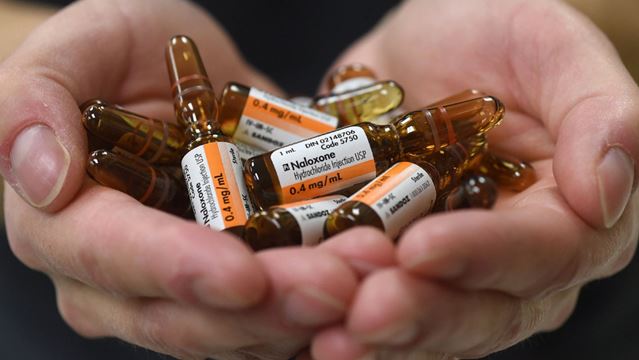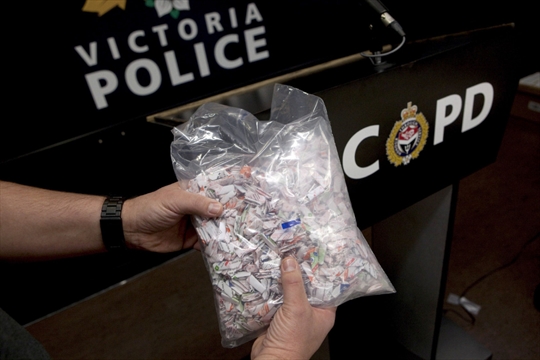Dec 16, 2016
|
Vote
0
0
The fentanyl crisis is so bad in B.C. —funeral homes are stocking up on Naloxone kits
SCROLL DOWN PLEASE AN OLDER ARTICLE BUT JUST AS RELEVANT IF NOT MORE SO.
There's something particularly agonizing about these deaths, even for a funeral director.
"It's the senselessness of it," John Romeyn said.
It's the father who sobbed as he sat across
from him at a table in his funeral home near Vancouver, British
Columbia. It's the look on the father's face as he realizes that instead
of picking an outfit for his daughter to wear to graduation, he's
choosing an outfit for her to wear in her casket.
Years ago, John Romeyn hardly ever heard
about local residents dying from overdoses of the synthetic opioid
fentanyl, he said. Now days, he sees about four fentanyl deaths a month
in his funeral home.
"We're getting tired of dealing with these
people dying needlessly," Romeyn said in an interview with The
Washington Post. "It's definitely on the increase, there's no question
about it."
The deaths are happening so frequently that
some funeral directors are supplying their premises with naloxone kits
to reverse possible overdoses among grieving loved ones or the staff who
handle the bodies of opioid overdose victims. The British Columbia
Funeral Association sent a bulletin to its members last month urging
funeral directors to carry the kits, the Vancouver Star reported.
The overdose crisis playing out in each
local funeral home is a microcosm of the fentanyl epidemic raging across
British Columbia, Canada's westernmost province and the epicentre of
opioid deaths in the country. In the first 10 months of 2016, 622 people
died from apparent illicit drug overdoses in British Columbia, compared
to 397 during the same period in 2015. About 60 per cent of the deaths
were linked to fentanyl, according to the British Columbia Coroners
Service.
In April, the provincial health officer
declared a public health emergency in British Columbia due to the
alarming increase in drug-related overdoses and deaths. It was the first
time he had exercised his emergency powers. By late September, 13,000
life-saving kits had been distributed across the province to sites such
as hospitals, jails, and health centers, the Canadian Press reported.
Many public servants who work at the
forefront of the crisis — particularly police officers — have begun
issuing naloxone nasal spray to front-line officers and support staff
who might come in contact with the drug while responding to overdoses.
In Vancouver, clandestine lab teams in HAZMAT suits that once
specialized in dismantling crystal meth labs are now being called in to
handle fentanyl seizures, the CBC reported. Several police officers in
the region have suffered overdose symptoms when seizing fentanyl powder.
Similar measures protecting police from drug
overdoses have been encouraged in the United States for years.
The DEA issued an alert last year
identifying fentanyl "as a threat to public health and safety," The Post
previously reported. In June, it created a "roll call" video to warn
law enforcement agencies nationwide "about the dangers of improperly
handling fentanyl and its deadly consequences."
"A very small amount ingested, or absorbed
through your skin, can kill you," said Jack Riley, the DEA's acting
deputy administrator.
But such precautions are also being taken in
far less expected realms in British Columbia, including funeral homes.
The funeral association is urging funeral homes to obtain naloxone in
part to protect the safety of embalmers, who often treat the bodies of
drug overdose victims and could encounter a trace of a potentially
lethal drug left undiscovered on a corpse or on personal items.
Additionally, Charlotte Poncelet, executive
director of the British Columbia Funeral Association, told the Vancouver
Sun that by having naloxone kits on hand in funeral homes, staff can be
better prepared to assist in case a grieving funeral attendee overdoses
during services.
Although Romeyn had not considered supplying
his funeral home with naloxone, he considers it a logical — and
potentially beneficial — precaution.
"There are people who do numb themselves
before they come to a funeral," he said. In a time of intense emotional
distress, the risk of an overdose could increase.
Many people don't realize the need for
funeral directors to be well-versed in first aid, Romeyn said. "Some
people say it's a bit too late for that."
But it's not the dead he's worried about.
"It's the mourners," he said. Funeral directors often come across family
members who experience fainting spells or even heart attacks, depending
on their physical state and how they grieve.
Romeyn understands the magnitude of drug
addiction in a deeply personal way — he was an addict himself for 27
years, he said. He's also seen the recent crisis affect his family
directly. His son was at a party recently where his friend experienced a
drug overdose and died. Witnessing the traumatic moment led Romeyn's
son to leave his job at the funeral home.
"We have to deal with the final aspect of
it," the funeral director said. Romeyn decided he needed to do something
about the epidemic ravaging his community. For the past few months, he
has begun working on a campaign with local schools, law enforcement, the
coroner's service, and other agencies to build awareness of the dangers
of fentanyl.
"The addicts know, they admit they take a
risk," Romeyn said. "The focus is more on these young people that are
going to pill parties and taking things that they have absolutely no
clue about."
He has not looked into getting naloxone for
the funeral home, but he plans to. At this point, it certainly couldn't
hurt, he said.
"I need to do something," he said.


No comments:
Post a Comment